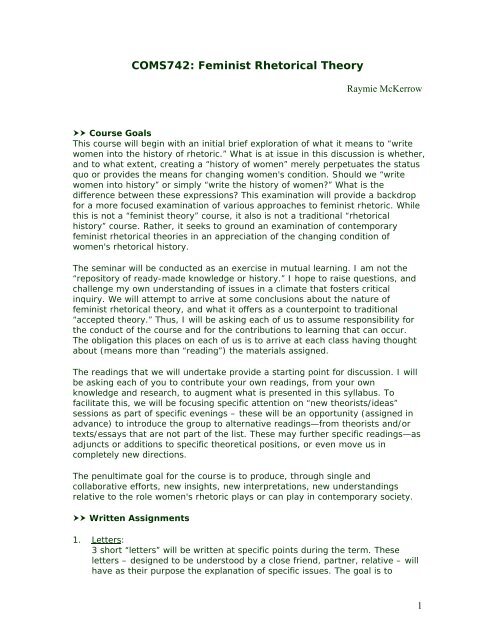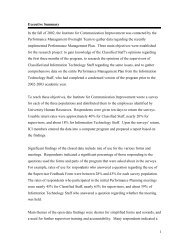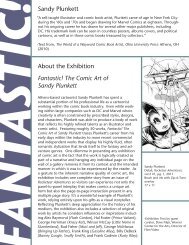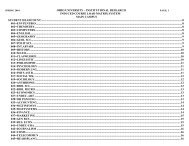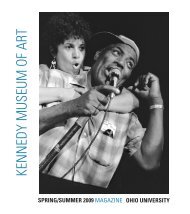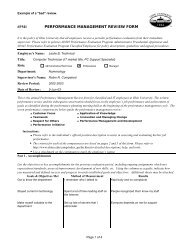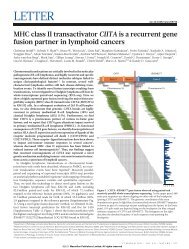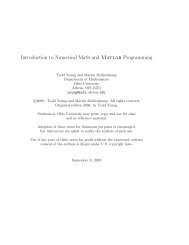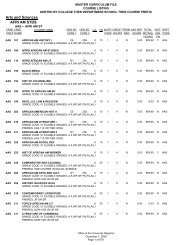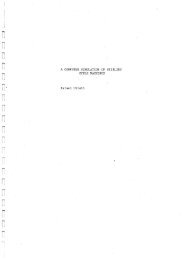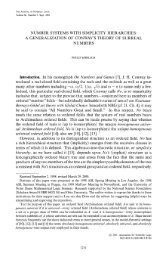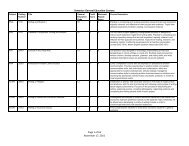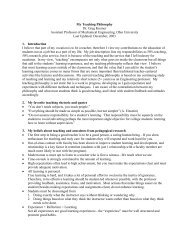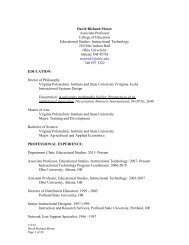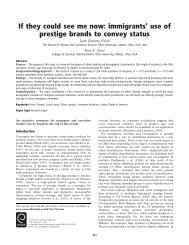COMS742: Feminist Rhetorical Theory - Ohio University
COMS742: Feminist Rhetorical Theory - Ohio University
COMS742: Feminist Rhetorical Theory - Ohio University
Create successful ePaper yourself
Turn your PDF publications into a flip-book with our unique Google optimized e-Paper software.
<strong>COMS742</strong>: <strong>Feminist</strong> <strong>Rhetorical</strong> <strong>Theory</strong><br />
Raymie McKerrow<br />
Course Goals<br />
This course will begin with an initial brief exploration of what it means to “write<br />
women into the history of rhetoric.” What is at issue in this discussion is whether,<br />
and to what extent, creating a “history of women” merely perpetuates the status<br />
quo or provides the means for changing women's condition. Should we “write<br />
women into history” or simply “write the history of women?” What is the<br />
difference between these expressions? This examination will provide a backdrop<br />
for a more focused examination of various approaches to feminist rhetoric. While<br />
this is not a “feminist theory” course, it also is not a traditional “rhetorical<br />
history” course. Rather, it seeks to ground an examination of contemporary<br />
feminist rhetorical theories in an appreciation of the changing condition of<br />
women's rhetorical history.<br />
The seminar will be conducted as an exercise in mutual learning. I am not the<br />
“repository of ready-made knowledge or history.” I hope to raise questions, and<br />
challenge my own understanding of issues in a climate that fosters critical<br />
inquiry. We will attempt to arrive at some conclusions about the nature of<br />
feminist rhetorical theory, and what it offers as a counterpoint to traditional<br />
“accepted theory.” Thus, I will be asking each of us to assume responsibility for<br />
the conduct of the course and for the contributions to learning that can occur.<br />
The obligation this places on each of us is to arrive at each class having thought<br />
about (means more than “reading”) the materials assigned.<br />
The readings that we will undertake provide a starting point for discussion. I will<br />
be asking each of you to contribute your own readings, from your own<br />
knowledge and research, to augment what is presented in this syllabus. To<br />
facilitate this, we will be focusing specific attention on “new theorists/ideas”<br />
sessions as part of specific evenings – these will be an opportunity (assigned in<br />
advance) to introduce the group to alternative readings—from theorists and/or<br />
texts/essays that are not part of the list. These may further specific readings—as<br />
adjuncts or additions to specific theoretical positions, or even move us in<br />
completely new directions.<br />
The penultimate goal for the course is to produce, through single and<br />
collaborative efforts, new insights, new interpretations, new understandings<br />
relative to the role women's rhetoric plays or can play in contemporary society.<br />
Written Assignments<br />
1. Letters:<br />
3 short “letters” will be written at specific points during the term. These<br />
letters – designed to be understood by a close friend, partner, relative – will<br />
have as their purpose the explanation of specific issues. The goal is to<br />
1
explain what you are reading, and your reaction to ideas, in a manner that a<br />
person unfamiliar with the issues would find provocative and meaningful in<br />
their own lives. You can be as creative as you'd like in representing ideas in<br />
ways a friend might understand and find interesting to read. These should<br />
run 750-1000 words or so—as a rough estimate.<br />
2. Book Review:<br />
As an alternative to the “Letters” – you may choose to write a book review<br />
suitable for submission to a journal. The review must be of a text that has<br />
not yet been reviewed by a journal (to the best of your knowledge), and<br />
must be written with a specific journal in mind. The length should be 2000-<br />
3000 words (roughly equivalent to the “Letters” assignment above). You will<br />
need to decide on this choice by the time the first “Letters” assignment is<br />
due.<br />
3. Research Paper:<br />
What I envision, at the very least, is a paper suitable for convention<br />
submission. The paper may focus on a specific theme or issue, a theorist or<br />
genre. The goal will be to emulate the various essays examined and thereby<br />
to contribute to the on-going task of advancing theoretical and/or critical<br />
studies of women's rhetoric. The paper may extol or critique feminist<br />
assumptions or examine shortcomings in particular theoretical positions<br />
assumed by one or more feminist theorists/theories. The paper may also<br />
utilize a specific theory or theorist as the framework of a critical assessment<br />
of a rhetoric (conceived in broad terms as a text that influences social reality<br />
in some identifiable manner). The paper should run 15-18 pages of text at a<br />
minimum.<br />
4. Creative Project:<br />
I am open to your suggesting an alternative to the research paper (e.g., a<br />
collaborative project); it must translate into approx. the same degree of<br />
difficulty and work as that associated with a research paper. The decision to<br />
move in this direction should be made (as with the research paper, by the 4<br />
the class session. A written proposal should accompany this request (long<br />
enough to clearly set forth the nature of the proposal and why it is not<br />
possible to achieve in a “traditional” format.<br />
Oral Assignments<br />
1. Facilitation:<br />
I am asking that specific individuals come prepared to ask questions related<br />
to the reading for that evening. This does not lessen the responsibility of<br />
others to join in the conversation, but does provide a “starting point” for 2-3<br />
issues that might be raised regarding the reading.<br />
2. Reports:<br />
When assigned, I will be asking for a 1-2 page handout that outlines the<br />
issues or themes represented in the work in question. These may be based<br />
on materials you bring into the discussion, or on materials assigned to<br />
augment or explore topics. The assumption is that we can't all read<br />
everything, but we can gain a better understanding of the available<br />
literature and issues through reports.<br />
2
Grades<br />
1. Participation: 20% (based on overall rather than graded each time)<br />
2. Reflection Papers: 4 0%<br />
3. Research Paper: 40%<br />
Texts<br />
Foss, Foss and Griffin, <strong>Feminist</strong> <strong>Rhetorical</strong> Theories, Sage, 1999.<br />
(available at Little Professor)<br />
Tentative Class Schedule<br />
Session Date Topic/Reading (see list-copied and available at Alden<br />
4/1 Orientation Session—Getting Organized<br />
note: I may not be here-a colleague will meet and distribute materials.<br />
4/8 Historical Context ( FFG1, 2; Readings - 1,2, 3, 4)<br />
4/15 FFG 3-Kramerae (24)<br />
4/22 FFG 4 – Hooks (26, 27, 30, 32)<br />
note: also ECA week—I may have to leave Tues for conference; if so, we<br />
will merge this session w/ 4/29 session<br />
4/29 Alternative Theories/theorists/reports (8, 62)<br />
5/6 FFG 5, 6 - Anzald ó a (33, 34); Alternatives (60, 63, 64)<br />
5/13 Daly/Alternative Theories/theorists/reports (38, 41, 43)<br />
5/20 FFG 7, 8 Starhawk/Allen (44-45)<br />
5/27 FFG 9 - Minh-ha – Alternative Theories/theorists (47)<br />
6/3 FFG 10, 11 - Gearhart/Johnson (52, 54, 59)<br />
6/9 As a possible make-up class day—we might decide to meet a final time<br />
during exam week???<br />
Readings: Historical Issues (*-copied-check at Alden Reference)<br />
* McKerrow, R. E. “Corporeality and Cultural Rhetoric: A Site for Rhetoric's<br />
Future.” Southern Communication Journal, 63, 1998, 315-328.<br />
* Donawerth, J. (Ed.). “Introduction.” In <strong>Rhetorical</strong> <strong>Theory</strong> by Women Before<br />
1900. (pp. xiii-xlii). Lanham, MD: Rowman & Littlefield, 2002.<br />
* Ballif, M. “ReDressing Histories: or, On Re/Covering Figures who have been<br />
laid bare by Our Gaze.” Rhetoric Society Quarterly, 22, 1992, 91-98.<br />
* Biesecker, B. “Coming to Terms with Recent Attempts to Write Women into<br />
the History of Rhetoric.” Philosophy and Rhetoric, 25, 1992, 140-61;<br />
* Rpt. In T. Poulakos, Rethinking the History of Rhetoric. (pp. 153-172).<br />
Boulder, CO : Westview Press, 1993.<br />
* Campbell, K. K. “Biesecker Cannot Speak for Her Either.” Philosophy and<br />
Rhetoric, 26, 1993, 153-159.<br />
* Biesecker, B. “Negotiating with our Tradition: Reflecting Again (without<br />
apologies) on the Feminization of Rhetoric.” Philosophy and Rhetoric, 26,<br />
1993, 236-241.<br />
* Ede , L., Glenn, C. & Lundsford, A. “Border Crossings: Intersections of<br />
3
Rhetoric and Feminism,” Rhetorica , 13, 1995, 401-443.<br />
* Dow, B. J. “Feminism, Difference(s), and <strong>Rhetorical</strong> Studies,”<br />
Communication Studies, 46, 1995, 106-117.<br />
* Blair, C. “Contested Histories of Rhetoric: The Politics of Preservation,”<br />
Quarterly Journal of Speech, 78, 1992, 403-428.<br />
* Lundsford, A. A. (Ed.). Reclaiming Rhetorica: Women in the <strong>Rhetorical</strong><br />
Tradition. Pittsburgh, PA: Univ. of Pittsburgh Press, 1995.<br />
* Wertheimer, M. M. (Ed.). Listening to their Voices: The <strong>Rhetorical</strong> Activities<br />
of Historical Women. Columbia, SC: Univ. of So. Carolina Press, 1997.<br />
* Sutherland, C. M. & Sutcliffe, R. (Eds.). The Changing Tradition: Womein in<br />
the History of Rhetoric. Calgary, Alberta: Univ. of Calgary Press, 1999.<br />
* Glenn, C. Rhetoric Retold: Regendering the Tradition from Antiquity Through<br />
the Renaissance. Carbondale, IL: Southern Illinois Univ. Press, 1997.<br />
* Levin, C. & Sullivan, P. A. (Eds.). Political Rhetoric, Power, and Renaissance<br />
Women. Albany, NY: SUNY Press, 1995.<br />
* Hobbs, C. (Ed.). Nineteenth Century Women Learn to Write. Charlottesville,<br />
VA: Univ. of Virginia Press, 1995.<br />
* Campbell, J. (Ed.). Toward a <strong>Feminist</strong> Rhetoric: The Writing of Gertrude<br />
Buck. Pittsburgh, PA: <strong>University</strong> of Pittsburgh Press, 1996.<br />
* Croll, E. Changing Identities of Chinese Women: Rhetoric, Experience and<br />
Self-Perception in the Twentieth-Century China. Zed Books, 1995.<br />
* Kochin, M. S. Gender and Rhetoric in Plato's Political Thought. Cambridge:<br />
Cambridge Univ. Press, 2002.<br />
* Olson, G. A. & Worsham, L. (Eds.). Race, Rhetoric, and the Postcolonial.<br />
Albany, NY: SUNY Press, 1998.<br />
* Ratcliffe, K. Anglo-American <strong>Feminist</strong> Challenges to the <strong>Rhetorical</strong><br />
Traditions. Carbondale, IL: Southern Illinois Univ. Press, 1996.<br />
* Walker, R. J. The Rhetoric of Struggle: Public Address by African American<br />
Women. NY: Garland, 1992. <strong>Rhetorical</strong> Studies.<br />
* Houston, M. & Kramerae, C. “Speaking from Silence: Methods of Silencing<br />
and Resistance.” Discourse & Society, 2, 1991, 387-399.<br />
* Kramerae, C. “Punctuating the Dictionary.” Int'l J. Soc. Lang., 94, 1992,<br />
135-154.<br />
* Kramerae, C. “Chronic Power Problems,” In Wood, J. & Gregg, R. Toward the<br />
21st Century. (pp. 209-217). Cresskill, NJ : Hampton Press.<br />
* Kramerae, C. “Shaking the Conventions of Higher Education or Appropriate<br />
and Appropriated Technology.” Paper presented at Women, Information and<br />
Technology in Industry and Technology Confernece, Queensland Univ. of<br />
Technology, 1997.<br />
* Hooks, B. “The Significance of the <strong>Feminist</strong> Movement.” In Hooks, B.,<br />
<strong>Feminist</strong> <strong>Theory</strong>: From Margin to Center. (pp. 33-41). Boston: South End,<br />
1984.<br />
* Hooks, B. “Changing Perspectives on Power,” Ibid. (pp. 83-93).<br />
* Hooks, B. “When I was a Young Soldier for the Revolution”: Coming to<br />
Voice.” In Hooks, B., Talking Back: Thinking <strong>Feminist</strong>, Thinking Black. (pp.<br />
11- 18). Boston: South End, 1989.<br />
* Hooks, B. “Liberation Scenes.” In Hooks, B., Yearning: Race, Gender, and<br />
Cultural Politics. (pp. 1 - 13). Boston South End, 1990.<br />
* Hooks, B. “Neo-Colonial Fantasies of Conquest: Hoop Dreams.” In Hooks, B.,<br />
Reel to Reel: Race, Sex, and Class at the Movies. (pp. 77-82).<br />
4
NY:Routledge, 1996.<br />
* Hooks, B. “The Oppositional Gaze: Black Female Spectators.” Ibid., (pp.<br />
197-213).<br />
* Griffin, C. L. “Angela Yvonne Davis.” In Leeman, R. W. (Ed.). African-<br />
American Orators . (pp. 60-70). Westport, CT : Greenwood Press, 1996.<br />
* Anzald ó a, G. “Speaking in Tongues: A Letter to 3 rd World Women<br />
Writers.” In Moraga, C. & Anzald ó a, G. This Bridge Called My Back:<br />
Writings by Radical Women of Color. (pp. 165-174). NY: Kitchen Table:<br />
Women of Color Press, 1981, 1983.<br />
* Palczewski, C. H. “Bodies, Borders, and Letters: Gloria Anzaldua's ‘Speaking<br />
in Tongues: A Letter to 3 rd World Writers.” Southern Communication<br />
Journal, ?? , 1-16.<br />
* Anzald ó a, G. “The Homeland; Moviemientos….” In Anzald ó a, G.,<br />
Borderlands: La Frontera: The New Mestiza. (pp. 1-23). San Francisco, CA:<br />
Aunt Lute, 1987.<br />
* Anzald ó a, G. “En rapport, In Opposition; “Towards a New Consciousness.”<br />
In Anzald ó a, G., (Ed.). Making Face, Making Soul. (pp. 142-148; 377-389).<br />
San Francisco, CA: Aunt Lute, 1990.<br />
* Anzald ó a, G. “El Paisano Is a Bird of Good Omen.” In G Ù mez, A, Moraga,<br />
C., & Romo-Carmona, M. (Eds.). Cuentos: Stories by Latinas. (pp. 153-175).<br />
NY: Kitchen Table: Women of Color Press, 1983.<br />
* Griffin, C. L. “Women as Communicators: Mary Daly's Hagiography as<br />
Rhetoric,” Communication Monographs, 60, 1993, 153-177.<br />
* Daly, M. “Sparking: The Fire of Female Friendship.” In Daly, M.<br />
Gyn/Ecolgoy: The Metaethics of Radical Feminism. (pp. 354-384). Boston:<br />
Beacon, 1978.<br />
* Daly, M. “Breaking Out: Volcanic Virtues.” In Daly, M. Pure Lust: Elemental<br />
<strong>Feminist</strong> Philosophy. (pp. 260-288; 289- ). Boston: Beacon, 1984.<br />
* Daly, M. “Spelling: The Casting of Spells.” In Daly, M. Websters' First New<br />
Intergalactic Wickedary of the English Language. (pp. 13-22). Boston:<br />
Beacon, 1987.<br />
* Daly, M. “Re-awakening the X-Factor/Faculty and Creating the Archaic<br />
Future.” In Daly, M. Quintessence: Realizing the Archaic Future. (pp. 110-<br />
147). Boston: Beacon, 1998.<br />
* Lorde, A. “An Open Letter to Mary Daly.” In Moraga, C. & Anzald ó a, G. This<br />
Bridge Called My Back: Writings by Radical Women of Color. (pp. 94-97).<br />
NY: Kitchen Table: Women of Color Press, 1981, 1983.<br />
* Starhawk. “The Coven.” In Starhawk. The Spiral Dance. (pp. 48-68). San<br />
Francisco, CA: Harper and Row, 1979.<br />
* Foss, S. K. & Griffin, C. L. “A <strong>Feminist</strong> Perspective on <strong>Rhetorical</strong> <strong>Theory</strong>:<br />
Toward a Clarification of Boundaries.” Western Journal of Communication,<br />
56 1992, 330-349. (on Starhawk)<br />
* Minh-ha, T. T. “The Totalizing Quest of Meaning.” In Renov, M. (Ed.).<br />
Theorizing Documentary. (pp. 90-107). NY: Routledge, 1993.<br />
* Minh-ha, T. T. “Difference: ‘A Special Third World Women Issue'” <strong>Feminist</strong><br />
Review, 25, 1987, 5-22.<br />
* Minh-ha, T. T. “Other then Myself/my other Self.” In Robertson, G., Mash,<br />
M, Tickner, L, Bird, J., Curtis, B., & Putnam, T. (Eds.), Travellers' Tales. (pp.<br />
9-26). NY: Routledge, 1994.<br />
* Minh-ha, T. T. “Surname Viet Given Name Nam.” In Minh-ha, T. T., Framer<br />
5
Framed. (pp. 49-91). NY: Routledge, 1992.<br />
* Trinh, T. Minh-Ha "Not You/Like You: Post-Colonial Women and the<br />
Interlocking Questions of Identity and Difference." In: Dangerous liaisons:<br />
gender, nation, and postcolonial perspectives / Anne McClintock, Aamir<br />
Mufti, and Ella Shohat, editors. pp: 415-419. Minneapolis: <strong>University</strong> of<br />
Minnesota Press, c1997. Cultural politics (Minneapolis, Minn. ) ; v. 11.<br />
* Gearhart, S. “WomanPower: Energy Re-Sourcement.” In Spretnak, C. (Ed.).<br />
The Politics of Women's Spirituality: Essays on the Rise of Spiritual Power<br />
Within the Women's Movement. (pp. 104-206). Garden City, NY: Doubleday,<br />
1982.<br />
* Gearhart, S. M. “The Womanization of Rhetoric.” Women's Studies Int.<br />
Quarterly, 2, 1979, 195-201.<br />
* Gearhart, S. M. “Whose Woods These Are.” In Foss, S. K. & Foss, K. A.<br />
Inviting Transformations: Presentational Speaking for a Changing World.<br />
(pp. 127-131). Prospect Heights, IL : Waveland Press, 1994.<br />
* Gearhart, S. M. “Notes from a Recovering Activist.” Sojourner: The Women's<br />
Forum, 21, 1995, 8-11.<br />
* Gearhart, S. M. “The Gatherstretch.” In Gearhart, S. M. The Wanderground:<br />
Stories of the Hill Women. (pp. 118-132). Boston: Alyson, 1984; orig. pub.<br />
1979).<br />
* Gearhart, S. M. “The Chipko.” Ms. (Sept-Oct., 1991, 64-69).<br />
* Johnson, S. “Who's Afraid of the Supreme Court.” In Johnson, S. Wildfire:<br />
Igniting the She/Volution. (pp. 7-57). Albuquerque, NM: Wildfire, 1989.<br />
* Johnson, S. “Ship Ahoy; Meet my Needs, Make me Happy; The Bears and<br />
Anarchy.” In Johnson, S. The Ship that Sailed into the Living Room. (pp. 1-<br />
3; 153-166; 263-275) Estancia, NM: Wildfire, 1991.<br />
* Miller, D. H. “The Future of <strong>Feminist</strong> <strong>Rhetorical</strong> Criticism.” In Wertheimer, M.<br />
M. (Ed.). Listening to their Voices: The <strong>Rhetorical</strong> Activities of Historical<br />
Women. (pp. 359-380). Columbia, SC: Univ. of So. Carolina Press, 1997.<br />
* Hegde, R. “Narratives of Silence: Rethinking Bender, Agency and Power<br />
from the Communication Experiences of Battered Women of South India.”<br />
Communication Studies, 47, 1996, 303-317.<br />
* Hegde, R. “Swinging the Trapeze: The Negotiation of Identity Among Asian<br />
Indian Immigrant Women in the United States.” In Tanno, D. B. & Gonzalez,<br />
A. (Eds.). Communication and Identity Across Cultures. (pp. 34-55).<br />
Thousand Oaks, CA : Sage, 1998.<br />
* Foss, S. K. & Giffin, C. L. “Beyond Persuasion: A Proposal for Invitational<br />
Rhetoric.” Communication Monographs, 62, 1995, 2-18.<br />
* Flores, L. A. “Creating Discursive Space through a Rhetoric of Difference:<br />
Chicana <strong>Feminist</strong>s Craft a Homeland.” Quarterly Journal of Speech, 82,<br />
1996, 142-156.<br />
* Martinez, J. M. “Speaking as a Chicana.” In Galindo, d. L. & Gonzales, M. D.<br />
(Eds.). Speaking Chicana: Voice, Power, and Identity. (pp. 59-84). Tuscon,<br />
U. of Arizona Press, 1999.<br />
6


